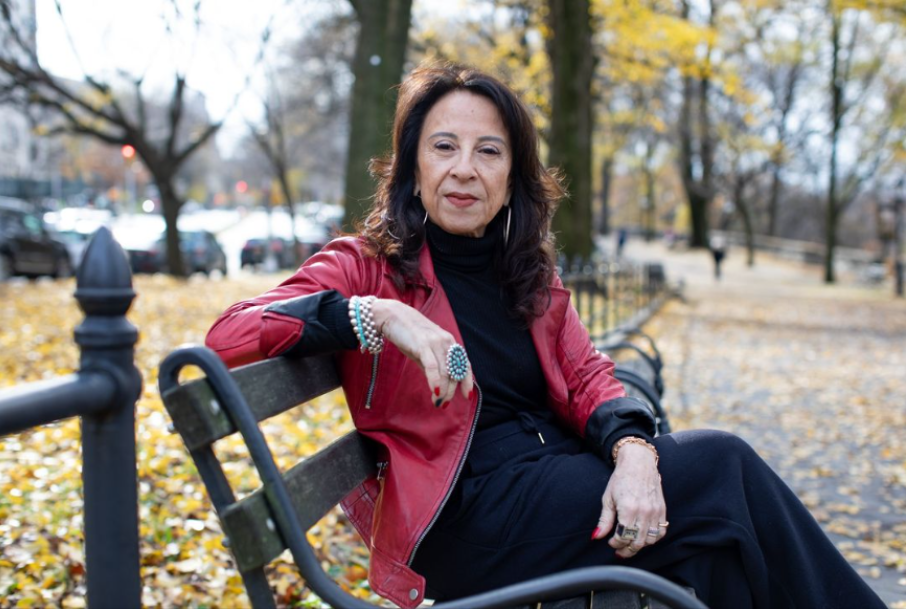
Host of Latino USA, Maria Hinojosa receives Edward R. Murrow Lifetime Achievement Award
Listen
(Runtime 3:41)
Read
Mexican-American journalist and host of Latino USA, Maria Hinojosa, received The Edward R. Murrow Lifetime Achievement Award in Pullman at Washington State University. NWPB’s Tracci Dial interviewed Hinojosa about covering immigration and journalistic objectivity.
On objectivity in journalism
Tracci Dial: How do you remain objective? You cover some really serious topics. Morality is a pretty straight line at times. So how do you remain objective as a journalist in coverage of situations like immigration?
Maria Hinojosa: So I think there’s a question of being fair. And then there’s the question of being objective. I don’t think that there’s like an objectivity God that exists that we can turn to and just be like… it would be Edward R. Murrow, right? Oh, Dear Edward, is this objective? It doesn’t exist. So, what we have to do as journalists is to plant our feet firmly on the ground in fact. Right? In our fact-base, and then in our actual, on the ground, frontline reporting. On the question of immigration, I can definitely be fair. I think it’s very important to hear multiple different points of view on the issue. But also, I’m an immigrant. So, it’s like, well, can she be objective? She’s a Mexican. I can be fair because as a journalist that is my job. That is one of the things I’m trained to do. But the other thing that I have to do as a journalist is I have to be entirely honest, and transparent. And because I do frontline reporting on the question of immigration, I always base it on that. For example, right now, there’s a whole conversation about people being afraid of what’s happening at the US-Mexico border. And I just got back from reporting there. And I was not afraid. The fear exists on the Mexican side of the border where there is a human trafficking war going on because of our policies. So, the fear exists, but on the Mexican side. On the U.S. side of the border the migrants who I saw were literally handing themselves over to the border patrol with arms up saying, ‘I’m here. Take all the data that you want.’ So that this question of, oh, they’re coming in, and they’re sneaking in, and we don’t know who they are, and what they’re trying to do… actually no. They’re giving themselves over. That’s a very different dynamic than what’s been reported.
Immigrant’s perspective
Maria Hinojosa: So, for me, some people might say, ‘Well, that’s not objective. It doesn’t sound like everybody else.’ And I’m like, exactly! Because I have this different experience because of who I am. Because of the fact that on the issue of immigration, which you brought up, that is the issue that I live every single day of my life. I’m an immigrant. My husband is an immigrant. We are U.S. citizens. It is part of my reality that makes me a better journalist. And it should make me and it does. For example, at MSNBC, where I’m a contributor with Futuro Media, it makes me to be more trustworthy. Whereas other people will say, ‘She’s Mexican, she’s an immigrant. Therefore, she’s less trustworthy.’ And I’m like, look at all of my reporting based on fact. You’re gonna see that it is fair, and it is real, and it is truthful, and it is honest, and it’s based on fact.
On diversity in newsrooms
Dial: Newsrooms really should reflect our communities, and we’re a diverse country. We’re a diverse region even for us at Northwest Public Broadcasting. So how do newsrooms do that? How do we reach out to a more diverse journalistic crew?
Hinojosa: By hiring them. If you want to have better journalism that is really telling the full story of, let’s just say, this region, you have to have that diversity in your newsroom. And then it will come. Well, actually, the bosses…whoever hired them, they have to listen to those younger, more diverse journalists, and do the stories that they’re saying matter. That will then bring the eyeballs that will then become loyal consumers of the media that we do.















